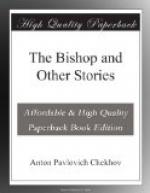The road from the Monastery, which had been excavated at the cost of no little labour in the chalk mountain, moved upwards, going almost like a spiral round the mountain, over roots and under sullen overhanging pines. . . .
The Donets was the first to vanish from our sight, after it the Monastery yard with its thousands of people, and then the green roofs. . . . Since I was mounting upwards everything seemed vanishing into a pit. The cross on the church, burnished by the rays of the setting sun, gleamed brightly in the abyss and vanished. Nothing was left but the oaks, the pines, and the white road. But then our carriage came out on a level country, and that was all left below and behind us. Alexandr Ivanitch jumped out and, smiling mournfully, glanced at me for the last time with his childish eyes, and vanished from me for ever. . . .
The impressions of the Holy Mountains had already become memories, and I saw something new: the level plain, the whitish-brown distance, the way side copse, and beyond it a windmill which stood with out moving, and seemed bored at not being allowed to wave its sails because it was a holiday.
THE STEPPE
The Story of a Journey
I
Early one morning in July a shabby covered chaise, one of those antediluvian chaises without springs in which no one travels in Russia nowadays, except merchant’s clerks, dealers and the less well-to-do among priests, drove out of N., the principal town of the province of Z., and rumbled noisily along the posting-track. It rattled and creaked at every movement; the pail, hanging on behind, chimed in gruffly, and from these sounds alone and from the wretched rags of leather hanging loose about its peeling body one could judge of its decrepit age and readiness to drop to pieces.
Two of the inhabitants of N. were sitting in the chaise; they were a merchant of N. called Ivan Ivanitch Kuzmitchov, a man with a shaven face wearing glasses and a straw hat, more like a government clerk than a merchant, and Father Christopher Sireysky, the priest of the Church of St. Nikolay at N., a little old man with long hair, in a grey canvas cassock, a wide-brimmed top-hat and a coloured embroidered girdle. The former was absorbed in thought, and kept tossing his head to shake off drowsiness; in his countenance an habitual business-like reserve was struggling with the genial expression of a man who has just said good-bye to his relatives and has had a good drink at parting. The latter gazed with moist eyes wonderingly at God’s world, and his smile was so broad that it seemed to embrace even the brim of his hat; his face was red and looked frozen. Both of them, Father Christopher as well as Kuzmitchov, were going to sell wool. At parting with their families they had just eaten heartily of pastry puffs and cream, and although it was so early in the morning had had a glass or two. . . . Both were in the best of humours.




